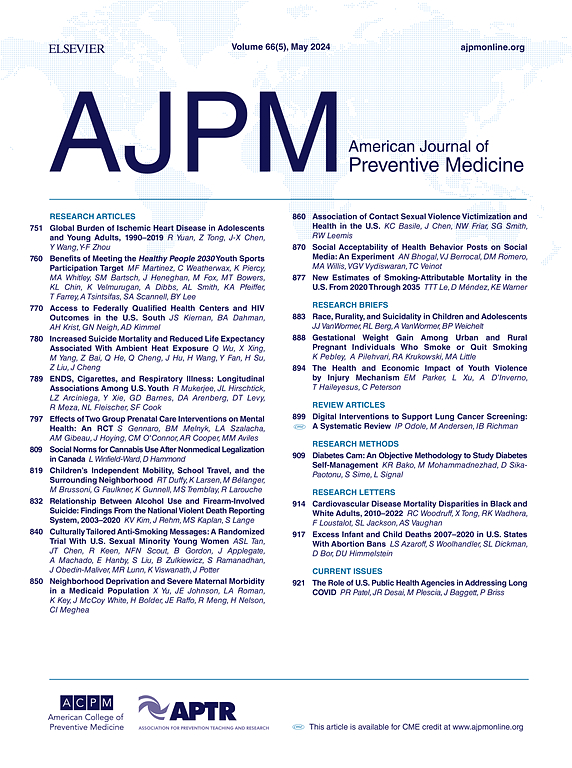Identifying physical health concerns of people with a mental health condition: an RCT.
IF 4.5
2区 医学
Q1 MEDICINE, GENERAL & INTERNAL
Caitlin Fehily, Ama Ampofo, Jade Ryall, Joanna Latter, Belinda Jackson, Emily Hielscher, Sumathi Govindasamy, Tara Clinton-McHarg, Julia Dray, Lucy Leigh, Jenny Bowman
求助PDF
{"title":"Identifying physical health concerns of people with a mental health condition: an RCT.","authors":"Caitlin Fehily, Ama Ampofo, Jade Ryall, Joanna Latter, Belinda Jackson, Emily Hielscher, Sumathi Govindasamy, Tara Clinton-McHarg, Julia Dray, Lucy Leigh, Jenny Bowman","doi":"10.1016/j.amepre.2025.108083","DOIUrl":null,"url":null,"abstract":"<p><strong>Introduction: </strong>PhysiCards© have been co-designed to support an interactive, person-led approach to help people with mental health conditions identify and respond to cardiovascular disease (CVD) and other physical health concerns. This study aimed to test the efficacy of the PhysiCards© in assisting people accessing support from a mental health community managed organisation to identify and take action to address CVD and other physical health concerns.</p><p><strong>Study design: </strong>Parallel-group randomised controlled trial.</p><p><strong>Setting/participants: </strong>Participants (>=18 years; N=154) were accessing Flourish Australia services in New South Wales.</p><p><strong>Intervention: </strong>Participants were randomly allocated to a control condition (physical health concerns discussed in line with usual support) or intervention condition (usual care and offered PhysiCards©) delivered in a single session.</p><p><strong>Main outcome measures: </strong>assessed through support worker records of allocation delivery, and participant self-report telephone surveys at baseline, and 1-week and 4-month follow-ups (September 2022 to January 2024). Analysis was conducted in 2025. Primary outcomes were identifying at least one concern participants wanted support for that was a: physical health concern, CVD prevention concern, 'new' (not previously raised with a health professional) physical health concern, and new CVD prevention concern.</p><p><strong>Secondary outcomes: </strong>discussing a concern with a health professional, confidence to raise concerns and acceptability of PhysiCards©.</p><p><strong>Results: </strong>Intervention group participants were significantly more likely to identify a: physical health concern they wanted support for (OR 16.7, 95% CI 5.14-54.24, p<.001), CVD-related concern (OR 7.89, 95% CI 2.91-21.39, p<.001), and new health concern (OR 7.40, 95% CI 2.28-24.05, p<.001). PhysiCards© were rated as highly acceptable. There was no significant difference in discussing concerns with a health professional or confidence in raising concerns.</p><p><strong>Conclusions: </strong>PhysiCards© were efficacious in supporting people to identify CVD and other physical health concerns. Future research is needed to consider additional strategies to enhance their impact on care-seeking.</p><p><strong>Trial registration: </strong>prospectively registered: https://osf.io/r8m97.</p>","PeriodicalId":50805,"journal":{"name":"American Journal of Preventive Medicine","volume":" ","pages":"108083"},"PeriodicalIF":4.5000,"publicationDate":"2025-09-06","publicationTypes":"Journal Article","fieldsOfStudy":null,"isOpenAccess":false,"openAccessPdf":"","citationCount":"0","resultStr":null,"platform":"Semanticscholar","paperid":null,"PeriodicalName":"American Journal of Preventive Medicine","FirstCategoryId":"3","ListUrlMain":"https://doi.org/10.1016/j.amepre.2025.108083","RegionNum":2,"RegionCategory":"医学","ArticlePicture":[],"TitleCN":null,"AbstractTextCN":null,"PMCID":null,"EPubDate":"","PubModel":"","JCR":"Q1","JCRName":"MEDICINE, GENERAL & INTERNAL","Score":null,"Total":0}
引用次数: 0
引用
批量引用
Abstract
Introduction: PhysiCards© have been co-designed to support an interactive, person-led approach to help people with mental health conditions identify and respond to cardiovascular disease (CVD) and other physical health concerns. This study aimed to test the efficacy of the PhysiCards© in assisting people accessing support from a mental health community managed organisation to identify and take action to address CVD and other physical health concerns.
Study design: Parallel-group randomised controlled trial.
Setting/participants: Participants (>=18 years; N=154) were accessing Flourish Australia services in New South Wales.
Intervention: Participants were randomly allocated to a control condition (physical health concerns discussed in line with usual support) or intervention condition (usual care and offered PhysiCards©) delivered in a single session.
Main outcome measures: assessed through support worker records of allocation delivery, and participant self-report telephone surveys at baseline, and 1-week and 4-month follow-ups (September 2022 to January 2024). Analysis was conducted in 2025. Primary outcomes were identifying at least one concern participants wanted support for that was a: physical health concern, CVD prevention concern, 'new' (not previously raised with a health professional) physical health concern, and new CVD prevention concern.
Secondary outcomes: discussing a concern with a health professional, confidence to raise concerns and acceptability of PhysiCards©.
Results: Intervention group participants were significantly more likely to identify a: physical health concern they wanted support for (OR 16.7, 95% CI 5.14-54.24, p<.001), CVD-related concern (OR 7.89, 95% CI 2.91-21.39, p<.001), and new health concern (OR 7.40, 95% CI 2.28-24.05, p<.001). PhysiCards© were rated as highly acceptable. There was no significant difference in discussing concerns with a health professional or confidence in raising concerns.
Conclusions: PhysiCards© were efficacious in supporting people to identify CVD and other physical health concerns. Future research is needed to consider additional strategies to enhance their impact on care-seeking.
Trial registration: prospectively registered: https://osf.io/r8m97.
确定有精神健康状况的人的身体健康问题:一项随机对照试验。
简介:PhysiCards©是共同设计的,旨在支持以人为本的互动式方法,帮助有精神健康状况的人识别和应对心血管疾病(CVD)和其他身体健康问题。本研究旨在测试PhysiCards©在帮助人们获得精神卫生社区管理组织的支持以识别和采取行动解决心血管疾病和其他身体健康问题方面的功效。研究设计:平行组随机对照试验。环境/参与者:参与者(>=18岁;N=154)正在使用新南威尔士州的“繁荣澳大利亚”服务。干预:参与者被随机分配到控制条件(根据通常的支持讨论身体健康问题)或干预条件(通常的护理和提供的PhysiCards©),在一次会议中提供。主要结局指标:通过支持工作者分配记录、基线时参与者自我报告电话调查、1周和4个月随访(2022年9月至2024年1月)进行评估。分析在2025年进行。主要结果是确定至少一个参与者希望得到支持的关注:身体健康关注,心血管疾病预防关注,“新的”(以前没有向健康专业人员提出)身体健康关注和新的心血管疾病预防关注。次要结果:与卫生专业人员讨论问题,有信心提出问题和对医师的可接受性©。结果:干预组参与者更有可能识别出他们需要支持的身体健康问题(OR 16.7, 95% CI 5.14-54.24)。结论:PhysiCards©在支持人们识别心血管疾病和其他身体健康问题方面是有效的。未来的研究需要考虑其他策略,以提高他们对寻求护理的影响。试验注册:预期注册:https://osf.io/r8m97。
本文章由计算机程序翻译,如有差异,请以英文原文为准。
来源期刊
期刊介绍:
The American Journal of Preventive Medicine is the official journal of the American College of Preventive Medicine and the Association for Prevention Teaching and Research. It publishes articles in the areas of prevention research, teaching, practice and policy. Original research is published on interventions aimed at the prevention of chronic and acute disease and the promotion of individual and community health.
Of particular emphasis are papers that address the primary and secondary prevention of important clinical, behavioral and public health issues such as injury and violence, infectious disease, women''s health, smoking, sedentary behaviors and physical activity, nutrition, diabetes, obesity, and substance use disorders. Papers also address educational initiatives aimed at improving the ability of health professionals to provide effective clinical prevention and public health services. Papers on health services research pertinent to prevention and public health are also published. The journal also publishes official policy statements from the two co-sponsoring organizations, review articles, media reviews, and editorials. Finally, the journal periodically publishes supplements and special theme issues devoted to areas of current interest to the prevention community.

 求助内容:
求助内容: 应助结果提醒方式:
应助结果提醒方式:


